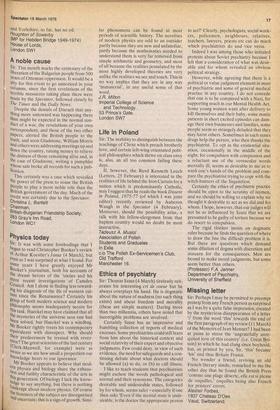Physics today
Sir: It was with some forebodings that I began to read Christopher Booker's review of Arthur Koestler's Janus (4 March), but even so I was surprised at what I found. For some years I have greatly enjoyed Mr Booker's journalism, both his accounts of the dream heroes of the 'sixties and his more recent investigations of Camden eouncil. Am I alone in finding less rewarding his diagnosis of the ills of western culture since the Renaissance? Certainly his grasp of both modern science and modern Philosophy seems inadequately secure for this task. Haeckel may have claimed that all the mysteries of the universe save one had been solved, but Haeckel was a windbag. Mr Booker rightly treats his contemporary equivalents with disrespect. Why should their predecessors be treated with rever!nee? The great scientists of the last century lelerk-Maxwell, for example) were as aware as we are how small a proportion our knowledge bears to our ignorance.
Mr Booker appears to believe that modfl Physics and biology share the exhaus
, and futility characteristic of the arts in generation. Of biology I lack the knowkedge to say anything, but there is nothing uankrupt about modern physics. Of course the frontiers of the subject are disorganised 'Ind uncertain; this is a sign of growth. Simi
lar phenomena can be found at most periods of scientific history. The novelties of modern physics are odd to an outsider partly because they are new and unfamiliar, partly because the mathematics needed to understand them is very far removed from simple arithmetic and geometry, and most of all because the realities postulated by the most highly developed theories are very unlike the realities we see and touch. This in no way implies that they are in any way 'immaterial', in any useful sense of that word.
J.R. Milton Imperial College of Science and Technology.
53 Prince's Gate, London SW7


































 Previous page
Previous page